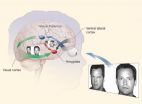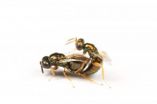(Press-News.org) A team of political scientists and neuroscientists has shown that liberals and conservatives use different parts of the brain when they make risky decisions, and these regions can be used to predict which political party a person prefers. The new study suggests that while genetics or parental influence may play a significant role, being a Republican or Democrat changes how the brain functions.
Dr. Darren Schreiber, a researcher in neuropolitics at the University of Exeter, has been working in collaboration with colleagues at the University of California, San Diego on research that explores the differences in the way the brain functions in American liberals and conservatives. The findings are published in the journal PLOS ONE on 13 February.
In a prior experiment, participants had their brain activity measured as they played a simple gambling game. Dr. Schreiber and his UC San Diego collaborators were able to look up the political party registration of the participants in public records. Using this new analysis of 82 people who performed the gambling task, the academics showed that Republicans and Democrats do not differ in the risks they take. However, there were striking differences in the participants' brain activity during the risk-taking task.
Democrats showed significantly greater activity in the left insula, a region associated with social and self-awareness. Meanwhile Republicans showed significantly greater activity in the right amygdala, a region involved in the body's fight-or-flight system. These results suggest that liberals and conservatives engage different cognitive processes when they think about risk.
In fact, brain activity in these two regions alone can be used to predict whether a person is a Democrat or Republican with 82.9% accuracy. By comparison, the longstanding traditional model in political science, which uses the party affiliation of a person's mother and father to predict the child's affiliation, is only accurate about 69.5% of the time. And another model based on the differences in brain structure distinguishes liberals from conservatives with only 71.6% accuracy.
The model also outperforms models based on differences in genes. Dr. Schreiber said: "Although genetics have been shown to contribute to differences in political ideology and strength of party politics, the portion of variation in political affiliation explained by activity in the amygdala and insula is significantly larger, suggesting that affiliating with a political party and engaging in a partisan environment may alter the brain, above and beyond the effect of heredity."
These results may pave the way for new research on voter behaviour, yielding better understanding of the differences in how liberals and conservatives think. According to Dr. Schreiber: "The ability to accurately predict party politics using only brain activity while gambling suggests that investigating basic neural differences between voters may provide us with more powerful insights than the traditional tools of political science."
### END
The party in your brain
2013-02-14
ELSE PRESS RELEASES FROM THIS DATE:
Threat bias interacts with combat, gene to boost PTSD risk
2013-02-14
Soldiers preoccupied with threat at the time of enlistment or with avoiding it just before deployment were more likely to develop post-traumatic stress disorder (PTSD), in a study of Israeli infantrymen. Such pre-deployment threat vigilance and avoidance, interacting with combat experience and an emotion-related gene, accounted for more than a third of PTSD symptoms that emerged later, say National Institutes of Health scientists, who conducted the study in collaboration with American and Israeli colleagues.
"Since biased attention predicted future risk for PTSD, computerized ...
CU-Boulder amphibian study shows how biodiversity can protect against disease
2013-02-14
The richer the assortment of amphibian species living in a pond, the more protection that community of frogs, toads and salamanders has against a parasitic infection that can cause severe deformities, including the growth of extra legs, according to a new study by the University of Colorado Boulder.
The findings, published Feb. 14 in the journal Nature, support the idea that greater biodiversity in larger-scale ecosystems, such as forests or grasslands, may also provide greater protection against diseases, including those that attack humans. For example, a larger number ...
Sustainable new catalysts fueled by a single proton
2013-02-14
CHESTNUT HILL, MA (Feb. 14, 2013) – Chemists at Boston College have designed a new class of catalysts triggered by the charge of a single proton, the team reports in the most recent edition of the journal Nature. The simple organic molecules offer a sustainable and highly efficient platform for chemical reactions that produce sets of molecules crucial to advances in medicine and the life sciences.
Unearthing a reliable, truly general, efficient synthesis of single mirror-image isomers has proven elusive. Previous methods suffer from a combination of extreme temperatures, ...
'Significant' proportion of HIV positive patients may not be telling NHS staff about their infection
2013-02-14
A significant proportion of HIV positive patients may not be disclosing their infection to NHS staff, when turning up for treatment at sexual health clinics, suggests preliminary research published online in the journal Sexually Transmitted Infections.
If the findings reflect a national trend, this could have implications for the true prevalence of undiagnosed HIV infection in the population, which is based on the numbers of "undiagnosed" patients at sexual health clinics, say the authors.
Currently, it is estimated that around one in four people in the UK who is HIV ...
California's Tobacco Control Program generates huge health care savings, UCSF study shows
2013-02-14
Over a span of nearly 20 years, California's tobacco control program cost $2.4 billion and reduced health care costs by $134 billion, according to a new study by UC San Francisco.
Additionally, the study -- covering the beginning of the program in 1989 to 2008 -- found that the state program helped lead to some 6.8 billion fewer packs of cigarettes being sold that would have been worth $28.5 billion in sales to cigarette companies.
The study was designed to calculate the fiscal impact of California's large public health program on smoking prevalence and cigarette consumption. ...
Cracking the semantic code
2013-02-14
We make choices about pretty much everything, all the time – "Should I go for a walk or grab a coffee?"; "Shall I look at who just came in or continue to watch TV?" – and to do so we need something common as a basis to make the choice.
Dr John Fennell and Dr Roland Baddeley of Bristol's School of Experimental Psychology followed a hunch that the common quantity, often referred to simply as reward, was a representation of what could be gained, together with how risky and uncertain it is. They proposed that these dimensions would be a unique feature of all objects and ...
Finding 'Mr. Right,' how insects sniff out the perfect mate
2013-02-14
TEMPE, Ariz. – You may want to ramp up your romance this year by sharing a candlelight dinner, a walk on the beach, or even the scent of a perfume, but will that help you find your perfect mate? For one wasp species, it only takes a whiff of his special love potion to know whether he's "Mr. Right."
Unlike humans, most insects rely on their sense of smell when looking for a mate. Scientists have found that sex pheromones play an important role in finding a suitable partner of the same species; yet, little is known about the evolution and genetic basis of these alluring ...
Scientists discover how animals taste, and avoid, high salt concentrations
2013-02-14
New York, NY (February 13, 2013) —For consumers of the typical Western diet—laden with levels of salt detrimental to long-term health—it may be hard to believe that there is such a thing as an innate aversion to very high concentrations of salt.
But Charles Zuker, PhD, and colleagues at Columbia University Medical Center have discovered how the tongue detects high concentrations of salt (think seawater levels, not potato chips), the first step in a salt-avoiding behavior common to most mammals.
The findings could serve as a springboard for the development of taste ...
A war without end -- with Earth's carbon cycle held in the balance
2013-02-14
CORVALLIS, Ore. – The greatest battle in Earth's history has been going on for hundreds of millions of years, isn't over yet, and until now no one knew it existed, scientists reported today in the journal Nature.
In one corner is SAR11, a bacterium that's the most abundant organism in the oceans, survives where most other cells would die and plays a major role in the planet's carbon cycle. It had been theorized that SAR11 was so small and widespread that it must be invulnerable to attack.
In the other corner, and so strange looking that scientists previously didn't ...
Penn geologists quantify, characterize sediment carried by Mississippi flood to Louisiana's wetlands
2013-02-14
PHILADELPHIA — The spring 2011 flood on the Mississippi was among the largest floods ever, the river swelling over its banks and wreaking destruction in the surrounding areas. But a University of Pennsylvania-led study also shows that the flood reaped environmental benefits — transporting and laying down new sediment in portions of the Delta — that may help maintain the area's wetlands.
The study, led by Ph.D. student Nicole Khan of the Department of Earth and Environmental Science, is the first to quantify the amount of sediment transported to wetlands by a flood on ...


